MARY LOUISE KELLY, HOST:
The United States has been without a permanent director of national intelligence for more than nine months. That ended today. The Senate has confirmed Republican Congressman John Ratcliffe for the top job in the intelligence community. This on the same day the Trump administration is pulling out of another international treaty, the Open Skies treaty with Russia. Well, we've got questions on both these developments for NPR national security correspondent Greg Myre.
Hi, Greg.
GREG MYRE, BYLINE: Hi, Mary Louise.
KELLY: Start with the new intelligence chief, John Ratcliffe, who may not be that well known to listeners. What should we know about him?
MYRE: He's a Texas congressman. He first got elected back in 2014. He's really made his name as an outspoken defender of President Trump during the Russia and Ukraine hearings and investigations. Perhaps his most visible platform was the House Intelligence Committee, which he joined last year. But he hasn't worked inside the intelligence community and has far less experience than any previous director of national intelligence, this post created after the 2001 al-Qaida attacks.
And the Democratic complaint has been that this job should go to someone who's nonpartisan, with a long track record, not a Trump loyalist with limited credentials. But the Senate's Republican majority carried the day and confirmed him.
KELLY: By a vote of 49-44, to note. I mean, as you mentioned, the head of U.S. intelligence is not supposed to be a political partisan. What are the expectations for Ratcliffe in this role?
MYRE: I think the big question will be, will he give the president bad news? The job description says you're supposed to tell the president things he doesn't want to hear, and the director of national intelligence often delivers this at the president's daily briefing. Now Ratcliffe instantly becomes a key adviser on things like China and the coronavirus pandemic and any signs of Russian election interference this year.
And at his confirmation hearing back on May 5, the Democrats repeatedly asked him whether he'd be able to do this, to deliver President Trump the unvarnished truth. Now, he insisted that he would be able to do that.
KELLY: Let me hold you on something you just mentioned for a sec, the question of Russian election interference, because that has been such a big bone of contention between President Trump and his intelligence leaders. What did Ratcliffe say about that at his confirmation hearing?
MYRE: Well, he really tried to avoid taking sides. He was pointedly asked whether he believed a Senate Intelligence Committee report that said Russia tried to help Trump in 2016 or a House Intelligence Committee report that said the Russians didn't assist. So the contradictory conclusions were in these two reports, and Ratcliffe said he didn't have a reason to doubt either version.
Now, Oregon Democratic Senator Ron Wyden, who's one of Ratcliffe's biggest critics, said this today about Ratcliffe on the Senate floor, just before the confirmation vote.
(SOUNDBITE OF ARCHIVED RECORDING)
RON WYDEN: All that matters is that he makes Donald Trump happy. And if Donald Trump doesn't want to acknowledge that the Russians helped him, then those are John Ratcliffe's marching orders.
KELLY: All right. Let's leave to the side for a moment the new DNI, Greg, 'cause I want to ask you about this other story which also does involve Russia - President Trump saying he will unilaterally pull the U.S. out of the Open Skies treaty with Russia. What does that mean?
MYRE: Well, this is a treaty that goes back - was worked out right after the end of the Cold War in the early '90s. It allows the U.S. and Russia and other countries as well to make unarmed flights over each other's territory to observe military forces. The idea is removing this Cold War uncertainty, greater transparency, make sure neither side is surprised. But many U.S. officials say Russia has consistently violated the treaty and blocked U.S. flights over Russian territory.
KELLY: All right. Lots to watch for as that plays out. That is NPR's Greg Myre.
Thank you, Greg.
MYRE: My pleasure. Transcript provided by NPR, Copyright NPR.



